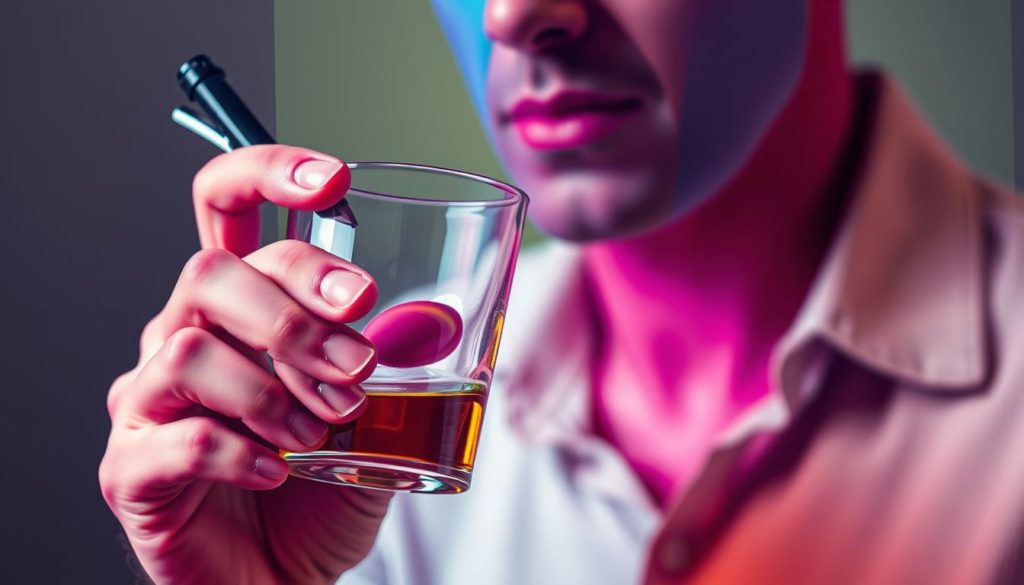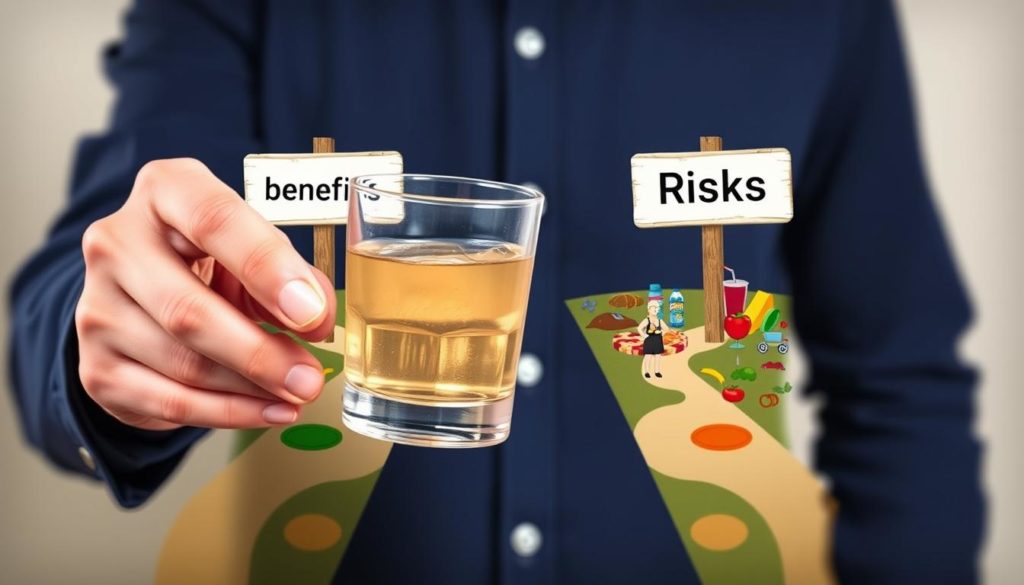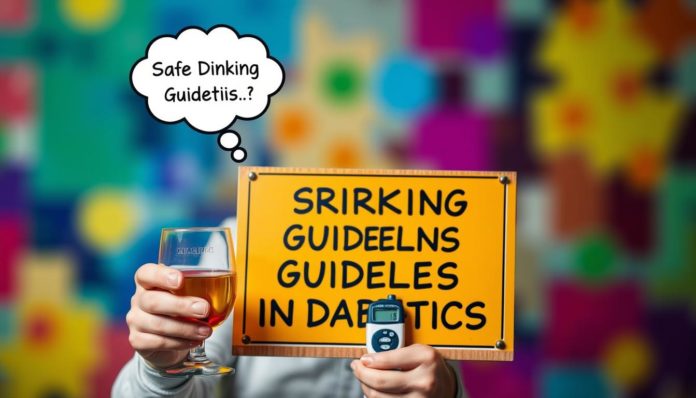About 34 million Americans live with diabetes. Many of them like to have a drink now and then. Drinking alcohol can be good for your heart if done carefully. However, people with diabetes face special risks. It’s important to know how to balance diabetes and drinking safely.
We’re here to offer guidance for those with diabetes who want to enjoy a drink without harm. You’ll learn how alcohol affects your blood sugar and get tips to stay safe. Our advice aims to help you manage your diabetes while still enjoying life.
Understanding the Relationship Between Alcohol and Diabetes
Exploring how alcohol and diabetes are connected is key for managing this condition. It’s important to consider factors like blood sugar and insulin. How the body reacts to drinking can be influenced by these factors.

How Alcohol Affects Blood Sugar Levels
The effects of drinking on blood sugar can differ. Consuming alcohol makes the liver focus on breaking it down first. This means it might not release enough glucose, leading to low blood sugar, or hypoglycemia. Drinking without eating increases the risk of this drop, raising diabetes risks.
Impact on Insulin Production
Drinking can also change how much insulin your body makes. In some cases, moderate drinking could help with blood sugar control by making the body more responsive to insulin. Yet, too much alcohol can have the opposite effect. It can mess up your blood sugar and insulin levels. So, it’s crucial to find a balance to avoid diabetes risks and understand the effects of drinking on blood sugar.
Benefits and Risks of Alcohol Consumption for Diabetics
For those managing diabetes, it’s key to understand alcohol’s effects. Drinking in moderation has surprising upsides, like heart health improvements. Research suggests a glass of red wine might help control blood sugar. Yet, asking doctors about drinking alcohol is crucial.

The benefits of alcohol for diabetics are there, but so are the risks. Alcohol can cause low blood sugar, especially with insulin or some diabetes meds. Alcohol also means extra calories, which could make weight management harder.
Low blood sugar symptoms can look a lot like being drunk. This makes it tough to tell them apart, which could delay help. When mixing diabetes and drinking, it’s safest to follow a doctor’s advice.
| Potential Benefit | Associated Risk |
|---|---|
| Cardiovascular health | Hypoglycemia |
| Blood glucose control | Weight gain |
| Social and psychological enjoyment | Blurred symptoms of low blood sugar |
Deciding on drinking alcohol with diabetes needs thoughtful reflection. Remember these points and choose what’s best for your health.
Safe Drinking Guidelines for Diabetics
For those with diabetes, it’s vital to know how to drink safely. While having alcohol occasionally can be okay, it’s important to follow guidelines closely. This ensures your health stays in check.
Recommended Alcohol Intake
The American Diabetes Association advises not going over one drink daily for women and two for men. Knowing what ‘one drink’ means is important for controlling your intake:
- Beer: 12 ounces
- Wine: 5 ounces
- Liquor: 1.5 ounces of distilled spirits
Sticking to these amounts helps manage alcohol consumption wisely, lowering any health risks.
Choosing the Right Types of Alcohol
Not all drinks are the same for people watching their sugar. Different alcohols can affect blood sugar and health differently. Picking light beer or dry wine is smarter because they have less alcohol and calories. These choices help make drinking with diabetes safer.
It’s crucial to always drink alcohol with food. Eating helps keep blood sugar stable, making drinking safer.
Managing Diabetes When Consuming Alcohol
Understanding how to handle diabetes and alcohol is key. If you have diabetes, knowing how alcohol affects your blood sugar is vital. Here are some strategies to help:
- Moderation: Keeping alcohol consumption within limits recommended by healthcare professionals.
- Monitoring Blood Sugar Levels: Regularly checking blood sugar before and after drinking to understand how alcohol impacts individual levels.
- Consuming Food Alongside Alcohol: Ensuring food is consumed with alcohol to prevent sharp drops in blood sugar levels.
- Understanding Individual Responses: Recognizing personal reactions to different types of alcohol and adjusting the intake accordingly.
- Healthcare Advice: Always consulting with a healthcare provider to get personalized advice and to know if alcohol should be avoided altogether.
By following these tips, you can enjoy alcohol without harming your health. It’s all about finding the right balance for your body’s needs.
Diabetic-Friendly Alcoholic Beverages
Finding drinks for those with diabetes can be easier than you think. It’s important to know which ones are safe for your blood sugar. Let’s look at low-sugar drinks and their carb content.
Low-Sugar Options
For stable blood sugar, choose low-sugar alcoholic options. Drinks like dry wines, vodka, gin, and whiskey have little to no sugar. These choices help you enjoy a drink without worrying about your diabetes.
- Dry Wines: They usually have less sugar.
- Spirits: Vodka, gin, and whiskey basically have no sugar.
- Light Beers: Offer lower sugar but still taste great.
Carb Content in Popular Drinks
Knowing the carbs in drinks helps with healthy choices. Here’s a guide to the carbs in different types of alcohol:
| Beverage | Carbs (g per serving) |
|---|---|
| Regular Beer | 10-15 |
| Light Beer | 3-6 |
| Dry Wine | 2-4 |
| Sweet Wine | 8-14 |
| Straight Spirits | 0 |
| Ciders | 15-20 |
Picking drinks wisely helps those with diabetes keep their sugar in check. Remember, drinking in moderation is crucial. Always watch how each drink affects your blood sugar.
Preventing Hypoglycemia While Drinking
Managing blood sugar levels with alcohol can be tough for those with diabetes. Knowing about diabetes risks with alcohol intake is key. This prevents low blood sugar episodes. The liver normally manages glucose, but alcohol changes this. It affects blood glucose levels.
Importance of Eating Before and During Alcohol Consumption
For diabetics, eating before and while drinking alcohol is critical. Food keeps blood glucose stable, fighting the effects of alcohol. This helps in managing the effects of drinking on blood sugar well.
Recognizing Symptoms of Hypoglycemia
Diabetics must know the signs of low blood sugar. These include dizziness, confusion, and sweating. It’s often confused with being drunk. People with diabetes should carry glucose tablets. Wearing a medical ID is also smart. It helps others recognize their condition in emergencies.
Diabetes and Alcohol Consumption
Knowing how diabetes and alcohol mix is crucial for safe choices. Alcohol can make blood sugar levels rise or fall. If you drink without eating, you might face hypoglycemia, a serious condition.
“Alcohol should always be consumed with caution, especially for individuals managing diabetes. It’s imperative to consult with a healthcare provider to tailor guidelines best suited for your condition.”
Understanding the link between diabetes and alcohol helps manage risks. Track how different drinks affect you. Opting for drinks low in carbs can keep your blood sugar more balanced.
The caloric content of drinks is important for those with diabetes. Alcohol has calories that don’t nourish but can lead to weight gain. This can make managing diabetes harder.
Before drinking, talking to a healthcare provider is advisable to ensure safety.
| Alcoholic Beverage | Carb Content (g) | Calories |
|---|---|---|
| Beer (12 oz) | 12-15 | 150-200 |
| Wine (5 oz) | 3-4 | 120-130 |
| Vodka (1.5 oz) | 0 | 100-110 |
Caloric Impact of Alcohol on Diabetes Management
When it comes to managing diabetes and alcohol, learning about calories in alcohol is key. Alcohol has about seven calories in each gram. This can lead to more calories consumed than planned. It’s crucial for those with diabetes to keep a balanced diet and stay at a healthy weight.
Considering the calories in alcohol isn’t just about the drinks themselves. It also includes eating more and not noticing how much you eat. The table below shows the calories in common drinks. It helps those with diabetes choose wisely.
| Beverage | Calories (per serving) |
|---|---|
| Beer (12 oz) | 153 |
| Wine (5 oz) | 125 |
| Vodka (1.5 oz) | 97 |
| Whiskey (1.5 oz) | 105 |
| Margarita (4 oz) | 168 |
Managing how alcohol affects calorie intake is important. One way is by picking drinks with fewer calories. Balancing how much alcohol you drink, planning meals, and exercising helps keep good health and manage diabetes.
When to Avoid Alcohol with Diabetes
For those with diabetes, knowing when to skip alcohol is key. It’s important to understand how alcohol and certain health issues interact. This knowledge is vital for safely managing diabetes.
Health Conditions That Warrant Caution
If you have diabetes and other health problems, be very careful. Here are some conditions where you should avoid alcohol:
- Diabetic Neuropathy: Alcohol can make nerve damage worse.
- Diabetic Retinopathy: Drinking can harm your vision more.
- Uncontrolled Blood Pressure: Alcohol can raise your blood pressure.
- High Triglycerides: Alcohol can increase blood fat levels.
- Kidney Damage: Alcohol can hurt weak kidneys.
Medication Interactions with Alcohol
Medications and alcohol can sometimes not mix well. Especially for diabetes, certain drugs react badly with alcohol, like sulfonylureas causing low blood sugar. It’s crucial to know these reactions.
| Medication | Potential Interaction | Advice |
|---|---|---|
| Sulfonylureas | Hypoglycemia | Avoid alcohol |
| Insulin | Increased risk of hypoglycemia | Use caution |
| Metformin | Lactic acidosis (rare) | Limit intake |
Tips for Responsible Drinking with Diabetes
Managing diabetes and drinking can be tough. But, you can still have a drink responsibly if you stick to some rules. Here are tips to help you choose smartly:
- Drink in Moderation: Keeping your drinking in check is key. For women, this means no more than one drink a day. For men, no more than two.
- Select Lower-Calorie Options: Choose drinks with fewer calories and less sugar. Try dry wines, light beers, and spirits with sugar-free mixers.
- Pair with Carbohydrate-Rich Meals: Always have carbs when you drink. It helps keep your blood sugar stable and prevents lows.
- Monitor Blood Sugar Levels: Check your blood sugar before, during, and after drinking. It’s important to stay safe while managing diabetes and alcohol.
- Avoid Substituting Alcohol for Meals: Never replace meals with alcohol or drink on an empty stomach. It could dangerously lower your blood sugar.
Let’s look at common drinks and their effects on diabetes:
| Beverage | Calories | Carbs (g) |
|---|---|---|
| Dry Wine (5 oz) | 120 | 2 |
| Light Beer (12 oz) | 100 | 5 |
| Whiskey (1.5 oz) | 100 | 0 |
| Margarita (4 oz) | 168 | 16 |
Being mindful about drinking when you have diabetes is crucial for your health. Always talk with your doctors about your drinking. And, keep these guidelines in mind before choosing a drink.
The Role of Healthcare Providers in Managing Alcohol Consumption
Healthcare providers are key in helping people with diabetes handle their drinking. They talk about drinking habits to keep blood sugar stable. This also helps check how alcohol and medicine interact, keeping you healthy.
Discussing Drinking Habits with Your Doctor
Talking honestly with your doctor about how much you drink is crucial. This helps them match advice to your health needs. Open talks about alcohol let your doctor tailor advice, important for diabetes care.
Personalized Drinking Guidelines
Understanding your drinking lets your doctor set personal advice. This includes your blood sugar, meds, and health. Following this advice means you can still enjoy parties without hurting your diabetes management.
For more details on alcohol and health, look at this systematic review.
Close work with your healthcare provider ensures your drinking supports your health. It fine-tunes diabetic drinking advice and encourages smart drinking habits.
FAQ
How does alcohol affect blood sugar levels for people with diabetes?
Alcohol makes the liver work on breaking it down first. This means less glucose gets released into the bloodstream. Drinking without eating can make this problem worse.
What is the effect of alcohol on insulin production?
Drinking alcohol can change how insulin works in the body. A little bit might help with insulin sensitivity. But drinking too much can make it worse.
Are there any benefits of moderate alcohol consumption for diabetics?
Moderate drinking might be good for your heart and help control blood sugar. But, it’s important to be careful. Drinking too much can lead to low blood sugar and weight gain.
What is the recommended alcohol intake for people with diabetes?
The ADA says women with diabetes should have no more than one drink a day. Men should stop at two. Always talk to your doctor for advice that’s right for you.
What types of alcohol are best for people with diabetes?
Choose light beers or dry wines. They have less alcohol and calories. Spirits without carbs are also a smart pick.
How should people with diabetes manage their condition when consuming alcohol?
Drink responsibly and always have food with your drinks. Keep an eye on your blood sugar. And talk about drinking with your doctor to know what works best for you.
Are there diabetic-friendly alcoholic beverages?
Yes, go for drinks low in sugar like dry wines and spirits. Knowing the carb content in beer, cider, and mixed drinks is key to smart choices.
How can diabetics prevent hypoglycemia while drinking alcohol?
Eating before and while you drink is key. It helps because the liver is busy with alcohol and not releasing glucose. Knowing how hypoglycemia and being drunk feel similar is also important.
What should people with diabetes consider about alcohol consumption?
Think about how alcohol affects your blood sugar and the risk of low blood sugar. Also, watch your calories. Talking with a doctor is essential for safe alcohol consumption.
How does alcohol affect the caloric intake for individuals with diabetes?
Alcohol means more calories, which challenges diabetes management. It can also lead to eating more and being less mindful, affecting weight management.
When should people with diabetes avoid alcohol?
Don’t drink if you have diabetic nerve damage, eye issues, unstable blood pressure, high blood fats, or kidney problems. Be careful with alcohol if you’re on certain diabetes meds.
What tips can help diabetics drink responsibly?
Drink in moderation and pick drinks low in calories. Eat carbs when you drink. Keep an eye on your blood sugar. Don’t replace meals with alcohol. Talk to your doctor about your drinking.
How important is discussing drinking habits with a healthcare provider?
Talking with your healthcare provider is very important. They give advice based on your health, blood sugar control, and medications. This ensures you can enjoy drinking safely.


